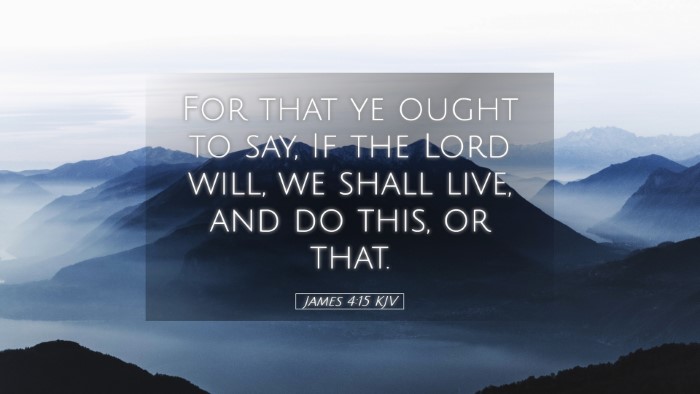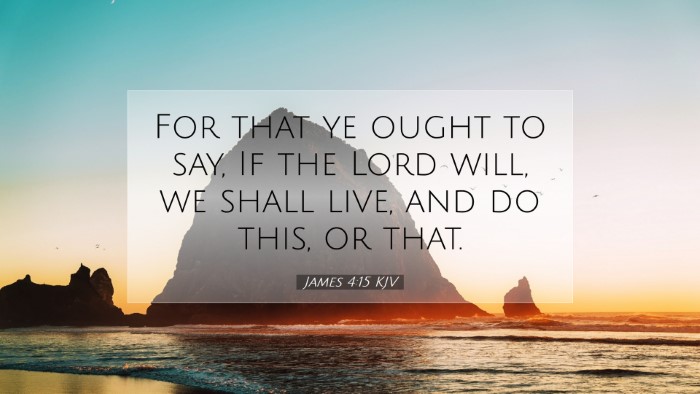Old Testament
Genesis Exodus Leviticus Numbers Deuteronomy Joshua Judges Ruth 1 Samuel 2 Samuel 1 Kings 2 Kings 1 Chronicles 2 Chronicles Ezra Nehemiah Esther Job Psalms Proverbs Ecclesiastes Song of Solomon Isaiah Jeremiah Lamentations Ezekiel Daniel Hosea Joel Amos Obadiah Jonah Micah Nahum Habakkuk Zephaniah Haggai Zechariah MalachiJames 4:15
James 4:15 KJV
For that ye ought to say, If the Lord will, we shall live, and do this, or that.
James 4:15 Bible Commentary
Commentary on James 4:15
Verse: "Instead, you ought to say, ‘If the Lord wills, we will live and do this or that.’" (James 4:15, ESV)
Introduction
The Epistle of James is renowned for its practical wisdom and ethical exhortations. In James 4:15, the Apostle calls believers to acknowledge God’s sovereignty over their plans and lives. This verse encapsulates a central theme of the Christian life: dependence on God's will. The following commentary blends insights from Matthew Henry, Albert Barnes, and Adam Clarke to offer a rich tapestry of understanding for pastors, students, theologians, and Bible scholars.
Contextual Considerations
James addresses a community that may be swayed by worldly wisdom, encouraging a humble reliance on God’s wisdom instead. The preceding verses discuss the folly of arrogance and boastfulness regarding future plans, emphasizing that life is but a vapor, fleeting and uncertain. Recognizing God's will is an antidote to pride and self-sufficiency.
Theological Insights
- Divine Sovereignty: The essence of James 4:15 underscores the necessity of submitting our plans to God’s will. Albert Barnes notes that believers should not assume that their future is within their control. Instead, they must recognize God’s overarching plan.
- The Nature of Life: Matthew Henry explains that life is transient and uncertain; thus, asserting our intentions without considering God’s will is tantamount to spiritual presumption. This verse serves as a reminder of our limited perspective in contrast to God’s eternal view.
- Humility in Planning: Clarke emphasizes the importance of humility when making plans. The phrase “if the Lord wills” fosters a posture of dependence and humility, acknowledging that any action, no matter how small, ultimately rests with God.
Practical Applications
The application of James 4:15 speaks profoundly to contemporary Christians navigating complexities in life and ministry:
- Cultivating a Spirit of Submission: Believers are called to embrace a mindset that regularly seeks God’s guidance in all decisions. This requires prayer and an openness to divine redirection.
- Encouraging Community Discourse: As a church community, intentions should be expressed with a collective understanding that God’s will reigns above individual aspirations. This nurtures unity and reliance on divine guidance.
- Integrating into Daily Life: Incorporate phrases like "if the Lord wills" into conversations and planning sessions to cultivate an awareness of God’s role in everyday decisions, thus training believers to practice humility.
Conclusion
James 4:15 serves as a powerful reminder for Christians to acknowledge God’s sovereignty in their lives. By combining the insights from Matthew Henry, Albert Barnes, and Adam Clarke, we find a multifaceted understanding of dependence on God’s will. This understanding fosters humility, encourages communal faith practices, and challenges believers to align their desires with God's eternal purposes, reflecting a life governed by faith rather than self-sufficiency.


